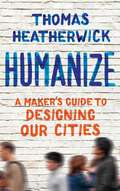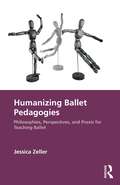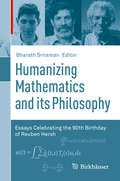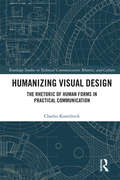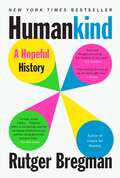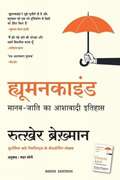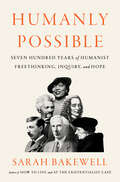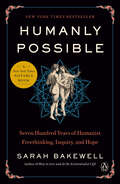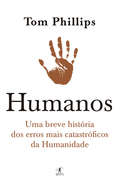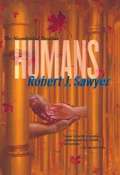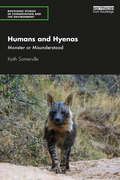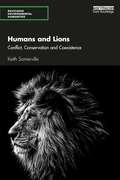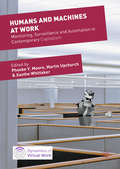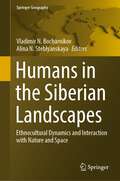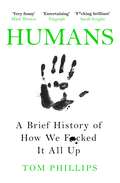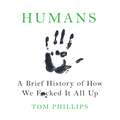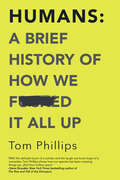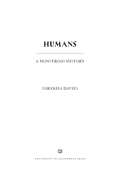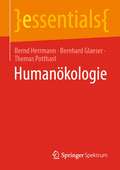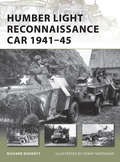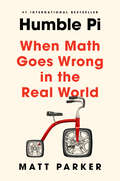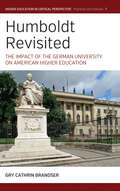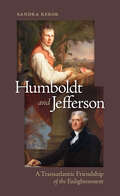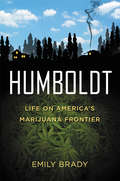- Table View
- List View
Humanize: A Maker's Guide to Designing Our Cities
by Thomas HeatherwickFrom one of the world&’s most innovative designers comes a fiercely passionate manifesto on why so many places have become miserable and boring and how we can make them better for everyone—featuring hundreds of photographs and illustrations that will change how you see the world around you.We are living through a global catastrophe. Buildings affect how we feel, moment by moment, day by day. They have the power to lift us up and make us feel awestruck, playful, safe, and inspired, just as they can make us feel alienated and sad. But many of the places where we live, work, learn, and heal have become monotonous and disposable. We&’re surrounded by cheap, boring buildings that make people stressed, sick, and unhappy. In short, much of our world has been crafted in a way that is hostile to human experience. Now, drawing on his experience of the last thirty years in making bold, beautiful objects and buildings, Thomas Heatherwick offers both an informed critique of the inhumanity in most of today&’s contemporary building design, and a rousing call for action. Looking through Heatherwick&’s eyes, we see familiar landmarks and cityscapes around the world, from London, Paris, Barcelona, Singapore, New York, Vancouver, and beyond, both old and new, famous and obscure, to learn how places can either sap the life out of us—or nourish our senses and our psyche. The time has come, he says, to put emotion back at the heart of the design process, and the reasons to do so could not be more urgent. Design is not superficial: it has an impact upon economics, climate change, our mental and physical wellbeing—even the peace and cohesion of our societies. As citizens and users, we need a world full of architectural diversity that delights and unites us. And as makers and designers, we can help create a world where cities reconnect with their essential mission: to provide human spaces where people mix, meet, inspire each other, and live out their full potential. Elegantly crafted by Heatherwick&’s own studio, and fully illustrated with hundreds of black-and-white photos, Humanize is an urgent call-to-arms for making our world a better place for everyone to live, and provides the vision and tools for us to make it a reality.
Humanizing Ballet Pedagogies: Philosophies, Perspectives, and Praxis for Teaching Ballet
by Jessica ZellerIn Humanizing Ballet Pedagogies, Jessica Zeller offers a new take on the ballet pedagogy manual, examining how and why ballet pedagogies develop, considering their implications for students and teachers, and proposing processes by which readers can enact humanizing, equitable approaches.This book supports pedagogical thinking and development in ballet. Across three parts, it reflects how pedagogies come to be: through rationales, dialogues, and practices. Part 1, Philosophies, offers a contextual reading of ballet pedagogy’s historic relationship to ideals, and it describes an alternative approach that takes its meaningful purpose from the embodied knowledge of participants in the ballet class. Part 2, Perspectives, looks at how the teacher’s person shapes the ballet class. It draws from a new survey of ballet students that illuminates the direct effects of pedagogies and proposes future directions. Praxis, Part 3, includes three theoretically based approaches that can be applied directly or adjusted to readers’ contexts for teaching ballet: yielding to student agency and autonomy, ungrading graded ballet classes in higher education, and practicing reflection for growth. Grounded in the wide range of people who participate in ballet, themes of equity, ethics, and humanity are at the heart of this book.Humanizing Ballet Pedagogies is a valuable resource for those teaching or developing a teaching approach in ballet. It addresses important issues for school owners, administrators, or anyone responsible for supporting ballet teachers or students in the twenty-first century.
Humanizing Mathematics and its Philosophy
by Bharath SriramanThis Festschrift contains numerous colorful and eclectic essays from well-known mathematicians, philosophers, logicians, and linguists celebrating the 90th birthday of Reuben Hersh. The essays offer, in part, attempts to answer the following questions set forth by Reuben himself as a focus for this volume: Can practicing mathematicians, as such, contribute anything to the philosophy of math? Can or should philosophers of math, as such, say anything to practicing mathematicians? Twenty or fifty years from now, what will be similar, and what will, or could, or should be altogether different: About the philosophy of math? About math education? About math research institutions? About data processing and scientific computing? The essays also offer glimpses into Reuben's fertile mind and his lasting influence on the mathematical community, as well as revealing the diverse roots, obstacles and philosophical dispositions that characterize the working lives of mathematicians. With contributions from a veritable "who's who" list of 20th century luminaries from mathematics and philosophy, as well as from Reuben himself, this volume will appeal to a wide variety of readers from curious undergraduates to prominent mathematicians.
Humanizing Visual Design: The Rhetoric of Human Forms in Practical Communication (Routledge Studies in Technical Communication, Rhetoric, and Culture)
by Charles KostelnickThis book analyzes the role that human forms play in visualizing practical information and in making that information understandable, accessible, inviting, and meaningful to readers—in short, "humanizing" it.Although human figures have long been deployed in practical communication, their uses in this context have received little systematic analysis. Drawing on rhetorical theory, art history, design studies, and historical and contemporary examples, the book explores the many rhetorical purposes that human forms play in functional pictures, including empowering readers, narrating processes, invoking social and cultural identities, fostering pathos appeals, and visualizing data.The book is aimed at scholars, teachers, and practitioners in business, technical, and professional communication as well as an interdisciplinary audience in rhetoric, art and design, journalism, engineering, marketing, science, and history.
Humankind: A Hopeful History
by Rutger Bregman<P><P>If there is one belief that has united the left and the right, psychologists and philosophers, ancient thinkers and modern ones, it is the tacit assumption that humans are bad. It's a notion that drives newspaper headlines and guides the laws that shape our lives. From Machiavelli to Hobbes, Freud to Pinker, the roots of this belief have sunk deep into Western thought. Human beings, we're taught, are by nature selfish and governed primarily by self-interest. <P><P>But what if it isn't true? International bestseller Rutger Bregman provides new perspective on the past 200,000 years of human history, setting out to prove that we are hardwired for kindness, geared toward cooperation rather than competition, and more inclined to trust rather than distrust one another. In fact this instinct has a firm evolutionary basis going back to the beginning of Homo sapiens. <P><P>From the real-life Lord of the Flies to the solidarity in the aftermath of the Blitz, the hidden flaws in the Stanford prison experiment to the true story of twin brothers on opposite sides who helped Mandela end apartheid, Bregman shows us that believing in human generosity and collaboration isn't merely optimistic---it's realistic. <P><P>Moreover, it has huge implications for how society functions. When we think the worst of people, it brings out the worst in our politics and economics. But if we believe in the reality of humanity's kindness and altruism, it will form the foundation for achieving true change in society, a case that Bregman makes convincingly with his signature wit, refreshing frankness, and memorable storytelling. <P><P><b>A New York Times Bestseller</b>
Humankind: ह्यूमनकाइंड
by Rutger Bregmanयह एक विश्वास ही है जो वामपन्थियों और दक्षिणपन्थियों को, मनोवैज्ञानिकों और दार्शनिकों को, लेखकों और इतिहासकारों को एकजुट करता है। यह उन सुर्खियों को प्रेरित करता है जो हमें घेरे रहती हैं और उन नियमों को संचालित करता है जो हमारे जीवन पर प्रभाव डालते हैं। पश्चिम के चिन्तन में इस विश्वास की जड़ें, मैकियावेली से लेकर हॉब्स तक और फ्रॉइड से लेकर डॉकिन्स तक, बहुत गहराई तक समाई हुई हैं। हमें सिखाया गया है कि मनुष्य अपने स्वभाव से ही स्वार्थी होते हैं और अपने हित से नियन्त्रित होते हैं। ह्यूमनकाइंड एक नया तर्क प्रस्तुत करती है: यह मानना कि लोग भले होते हैं, व्यावहारिक होने के साथ-साथ क्रान्तिकारी भी है। प्रतिस्पर्धा करने की बजाय सहयोग करने की, अविश्वास करने की बजाय भरोसा करने की प्रवृत्ति का आधार हमारी प्रजाति के आरम्भ से ही हमारी विकास-प्रक्रिया में मौजूद रहा है। दूसरों को उनके निकृष्टतम रूप में देखना न स़िर्फ दूसरों के प्रति हमारे रुख को, बल्कि हमारी राजनीति और अर्थव्यवस्था को भी प्रभावित करता है। अन्तरराष्ट्रीय स्तर के बेस्टसेलिंग लेखक रुत्ख़ेर ब्रेख़्मान इस महत्त्वपूर्ण पुस्तक में दुनिया के कुछ सर्वाधिक प्रसिद्ध अध्ययनों को आधार मान कर और उन्हें नये सिरे से संयोजित कर मानव-इतिहास के पिछले 200, 000 वर्षों के बारे में एक नया परिप्रेक्ष्य उपलब्ध कराते हैं। वास्तविक जीवन के लॉर्ड ऑफ़ द फ़्लाइज़ से लेकर ब्लिट्ज़ के बाद सामने आये सहयोग तक, स्टेन्फ़ोर्ड प्रिज़न एक्सपेरीमेंट की छिपी हुई गड़बड़ियों से लेकर किटी जेनोवीस की हत्या के सच्चे क़िस्से तक, ब्रेख़्मान साबित करते हैं कि किस तरह मानवीय दयालुता और परोपकार हमारे सोचने के ढंग को बदल सकते हैं- और हमारे समाज में वास्तविक परिवर्तन लाने की भूमिका निभा सकते हैं। यह मानव-स्वभाव के बारे में नया द़ृष्टिकोण अपनाने का समय है।
Humanly Possible: Seven Hundred Years of Humanist Freethinking, Inquiry, and Hope
by Sarah BakewellThe bestselling, prizewinning author of How to Live and At the Existentialist Café explores 700 years of writers, thinkers, scientists and artists, all trying to understand what it means to be truly human. If you are reading this, it&’s likely you already have some affinity with humanism, even if you don&’t think of yourself in those terms. You may be drawn to literature and the humanities. You may prefer to base your moral choices on fellow-feeling and responsibility to others rather than on religious commandments. Or you may simply believe that individual lives are more important than grand political visions or dogmas.If any of these apply, you are part of a long tradition of humanist thought, and you share that tradition with many extraordinary individuals through history who have put rational enquiry, cultural richness, freedom of thought and a sense of hope at the heart of their lives.Humanly Possible introduces us to some of these people, as it asks what humanism is and why it has flourished for so long, despite opposition from fanatics, mystics and tyrants. It is a book brimming with ideas, personalities and experiments in living – from the literary enthusiasts of the fourteenth century to the secular campaigners of our own time, from Erasmus to Esperanto, from anatomists to agnostics, from Christine de Pizan to Bertrand Russell, and from Voltaire to Zora Neale Hurston. It takes us on an irresistible journey, and joyfully celebrates open-mindedness, optimism, freedom and the power of the here and now—humanist values which have helped steer us through dark times in the past, and which are just as urgently needed in our world today. The bestselling, prizewinning author of How to Live and At the Existentialist Café explores 700 years of writers, thinkers, scientists and artists, all trying to understand what it means to be truly human.
Humanly Possible: Seven Hundred Years of Humanist Freethinking, Inquiry, and Hope
by Sarah BakewellThe New York Times bestseller • One of Barack Obama's Favorite Books of 2023 • A New York Times Notable Book &“A book of big and bold ideas, Humanly Possible is humane in approach and, more important, readable and worth reading. . . Bakewell is wide-ranging, witty and compassionate.&” –Wall Street Journal&“Sweeping… linking philosophical reflections with vibrant anecdotes.&” — The New York Times The bestselling author of How to Live and At the Existentialist Café explores seven hundred years of writers, thinkers, scientists, and artists, all trying to understand what it means to be truly humanHumanism is an expansive tradition of thought that places shared humanity, cultural vibrancy, and moral responsibility at the center of our lives. The humanistic worldview—as clear-eyed and enlightening as it is kaleidoscopic and richly ambiguous—has inspired people for centuries to make their choices by principles of freethinking, intellectual inquiry, fellow feeling, and optimism.In this sweeping new history, Sarah Bakewell, herself a lifelong humanist, illuminates the very personal, individual, and, well, human matter of humanism and takes readers on a grand intellectual adventure.Voyaging from the literary enthusiasts of the fourteenth century to the secular campaigners of our own time, from Erasmus to Esperanto, from anatomists to agnostics, from Christine de Pizan to Bertrand Russell, and from Voltaire to Zora Neale Hurston, Bakewell brings together extraordinary humanists across history. She explores their immense variety: some sought to promote scientific and rationalist ideas, others put more emphasis on moral living, and still others were concerned with the cultural and literary studies known as &“the humanities.&” Humanly Possible asks not only what brings all these aspects of humanism together but why it has such enduring power, despite opposition from fanatics, mystics, and tyrants.A singular examination of this vital tradition as well as a dazzling contribution to its literature, this is an intoxicating, joyful celebration of the human spirit from one of our most beloved writers. And at a moment when we are all too conscious of the world&’s divisions, Humanly Possible—brimming with ideas, experiments in living, and respect for the deepest ethical values—serves as a recentering, a call to care for one another, and a reminder that we are all, together, only human.
Humanos: Una Breve Historia De Cómo Lo Jodimos Todo
by Tom PhillipsUMA VIAGEM EMOCIONANTE PELOS MOMENTOS MAIS CATASTRÓFICOS DA HISTÓRIA DA HUMANIDADE «Por muito longe que a humanidade vá, por muitos desafios que conquistemos, a catástrofe está sempre ao virar da esquina.» Passaram 70 mil anos desde que os primeiros humanos modernos caminham sobre a Terra. Neste aparentemente curto espaço de tempo, conseguimos criar a Arte, a Cultura, a Ciência e o Comércio, além de nos termos posicionado como espécie dominante e indefectível, no topo da cadeia alimentar de todo um planeta.Embora seja deveras impressionante este domínio do jovem ser humano sobre um planeta tão antigo, na verdade seria mais correcto falarmos de sorte do que de uma conquista. Com efeito, foram tantas as vezes que nos colocámos à beira do abismo prestes a dar o passo em frente, que é um milagre ainda não estarmos extintos. Quem sabe se não o conseguimos em breve# Humanos, uma breve história dos momentos mais bizarros da Humanidade oferece-nos uma vista panorâmica da humanidade no seu pior: de Lucy, o nosso primeiro antepassado que caiu de uma árvore e morreu com um braço partido, ao exército austríaco que se atacou a si mesmo no seguimento de uma noite de bebedeira, passando pela eleição democrática de péssimos líderes políticos, invenções que podiam ter eliminado a vida da Terra com relativa rapidez, esquecimentos impensáveis e ideias peregrinas que nunca deveriam ter sido sequer pensadas, esta é a história de todas aquelas vezes em que tudo poderia ter acabado da pior maneira para a espécie humana. Neste compêndio único e profundamente irónico dos erros mais catastróficos e potencialmente fatais da história humana, Tom Phillips consegue a proeza de nos divertir, informar e fazer reflectir acerca do pior inimigo do homem: ele próprio. Os elogios da crítica «Uma história ligeira dos momentos em que os humanos se enganaram tão redondamente# Uma óptima e divertida leitura.»The Telegraph «Nos tempos negros que vivemos hoje, é consolador perceber que sempre fomos os mesmos idiotas sem noção.»Stuart Heritage «Tom Phillips provou, sem sombra de dúvida, que só por sorte ainda habitamos a terra e que não parece estar na nossa lista de prioridades mantermos a viabilidade e relevância da espécie humana. Se gostava de evitar vir um dia a orbitar a terra numa prisão feita de lixo, acho que este livro é para si.»Sarah Knight "Tom Philipps é um homem profundamente inteligente e divertido - e nota-se. Se Sapiens nos dá conta da sofisticação humana, esta história dos nossos fracassos não permite que nos esqueçamos do quão estúpidos são os humanos." Greg Jenner "Humanos conta a história dos muitos disparates da Humanidade com uma satisfação perversa e grande astúcia#" Business Standard
Humans (Neanderthal Parallax #2)
by Robert J. Sawyersecond in the neanderthal parallax trilogy, which was begun with Hominids.
Humans and Hyenas: Monster or Misunderstood (Routledge Studies in Conservation and the Environment)
by Keith SomervilleHumans and Hyenas examines the origins and development of the relationship between the two to present an accurate and realistic picture of the hyena and its interactions with people. The hyena is one of the most maligned, misrepresented and defamed mammals. It is still, despite decades of research-led knowledge, seen as a skulking, cowardly scavenger rather than a successful hunter with complex family and communal systems. Hyenas are portrayed as sex-shifting deviants, grave robbers and attackers of children in everything from African folk tales through Greek and Roman accounts of animal life, to Disney’s The Lion King depicting hyenas with a lack of respect and disgust, despite the reality of their behaviour and social structures. Combining the personal, in-depth mining of scientific papers about the three main species and historical accounts, Keith Somerville delves into our relationship with hyenas from the earliest records from millennia ago, through the accounts by colonisers, to contemporary coexistence, where hyenas and humans are forced into ever closer proximity due to shrinking habitats and loss of prey. Are hyenas fated to retain their bad image or can their amazing ability to adapt to humans more successfully than lions and other predators lead to a shift in perspective? This book will be of great interest to students and scholars in the environmental sciences, conservation biology, and wildlife and conservation issues.
Humans and Lions: Conflict, Conservation and Coexistence (Routledge Environmental Humanities)
by Keith SomervilleThis book places lion conservation and the relationship between people and lions both in historical context and in the context of the contemporary politics of conservation in Africa. The killing of Cecil the Lion in July 2015 brought such issues to the public’s attention. Were lions threatened in the wild and what was the best form of conservation? How best can lions be saved from extinction in the wild in Africa amid rural poverty, precarious livelihoods for local communities and an expanding human population? This book traces man’s relationship with lions through history, from hominids, to the Romans, through colonial occupation and independence, to the present day. It concludes with an examination of the current crisis of conservation and the conflict between Western animal welfare concepts and sustainable development, thrown into sharp focus by the killing of Cecil the lion. Through this historical account, Keith Somerville provides a coherent, evidence-based assessment of current human-lion relations, providing context to the present situation. This book will be of interest to students and scholars of environmental and African history, wildlife conservation, environmental management and political ecology, as well as the general reader.
Humans and Machines at Work
by Martin Upchurch Phoebe V. Moore Xanthe WhittakerThis edited collection provides a series of accounts of workers' local experiences that reflect the ubiquity of work's digitalisation. Precarious gig economy workers ride bikes and drive taxis in China and Britain; call centre workers in India experience invasive tracking; warehouse workers discover that hidden data has been used for layoffs; and academic researchers see their labour obscured by a 'data foam' that does not benefit them. These cases are couched in historicalaccounts of identity and selfhood experiments seen in the Hawthorne experiments and the lineage of automation. This book will appeal to scholars in the Sociology of Work and Digital Labour Studies and anyone interested in learning about monitoring and surveillance, automation, the gig economy and the quantified self in the workplace.
Humans in Shackles: An Atlantic History of Slavery
by Ana Lucia AraujoA sweeping narrative history of the Atlantic slave trade and slavery in the Americas. During the era of the Atlantic slave trade, more than twelve million enslaved Africans were forcibly transported to the Americas in cramped, inhumane conditions. Many of them died on the way, and those who survived had to endure further suffering in the violent conditions that met them onshore. Covering more than three hundred years, Humans in Shackles grapples with this history by foregrounding the lived experience of enslaved people in tracing the long, complex history of slavery in the Americas. Based on twenty years of research, this book not only serves as a comprehensive history; it also expands that history by providing a truly transnational account that emphasizes the central role of Brazil in the Atlantic slave trade. Additionally, it is deeply informed by African history and shows how African practices and traditions survived and persisted in the Americas among communities of enslaved people. Drawing on primary sources including travel accounts, pamphlets, newspaper articles, slave narratives, and visual sources such as artworks and artifacts, Araujo illuminates the social, cultural, and religious lives of enslaved people working in plantations and urban areas, building families and cultivating affective ties, congregating and re-creating their cultures, and organizing rebellions. Humans in Shackles puts the lived experiences of enslaved peoples at the center of the story and investigates the heavy impact these atrocities have had on the current wealth disparity of the Americas and rampant anti-Black racism.
Humans in the Siberian Landscapes: Ethnocultural Dynamics and Interaction with Nature and Space (Springer Geography)
by Vladimir N. Bocharnikov Alina N. SteblyanskayaThis book considers theoretical issues of the ethnocultural landscape concepts at large as well as examples of its practical application in ethnic communities of Siberia. It reveals the patterns of the processes of penetration, settlement, development and adaptation of Siberian populations from Paleolithic time to Russian colonization in the era of the Russian Empire, during Soviet modernization and in the face of modern challenges. The authors consider the principal interactions (character, stages, conditions), system-related evidence and phenomena that determine the diverse specifics and multidirectional vectors of a change in the ethnic (social, cultural, economic, legal) presence in large subregions of Siberia in the mirror of various theoretical paradigms. This transdisciplinary volume appeals to researchers, lecturers and students in the fields of geography, history, philosophy, anthropology, ecology, archaeology and interfaces to many other disciplines.
Humans: A Brief History of How We F*cked It All Up
by Tom Phillips'This book is brilliant. Utterly, utterly brilliant. Apart from the epilogue, which is idiotic' Jeremy Clarkson'F*cking brilliant' Sarah KnightAN EXHILARATING JOURNEY THROUGH THE MOST CREATIVE AND CATASTROPHIC F*CK-UPS OF HUMAN HISTORYIn the seventy thousand years that modern human beings have walked this earth, we've come a long way. Art, science, culture, trade - on the evolutionary food chain, we're real winners. But, frankly, it's not exactly been plain sailing, and sometimes - just occasionally - we've managed to really, truly, quite unbelievably f*ck things up.From Chairman Mao's Four Pests Campaign, to the American Dustbowl; from the Austrian army attacking itself one drunken night, to the world's leading superpower electing a reality TV mogul as President... it's pretty safe to say that, as a species, we haven't exactly grown wiser with age.So, next time you think you've really f*cked up, this book will remind you: it could be so much worse...FURTHER PRAISE FOR HUMANS:'Very funny' Mark Watson'A light-touch history of moments when humans have got it spectacularly wrong... Both readable and entertaining' The Telegraph'Chronicles humanity's myriad follies down the ages with malicious glee and much wit ... a rib-tickling page-turner' Business Standard'A timely, irreverent gallop through thousands of years of human stupidity' Nicholas Griffin, Ping-Pong Diplomacy: The Secret History Behind the Game That Changed the World
Humans: A Brief History of How We F*cked It All Up
by Tom Phillips'This book is brilliant. Utterly, utterly brilliant' Jeremy Clarkson'F*cking brilliant' Sarah KnightREAD FOR YOU BY CRITICALLY ACCLAIMED COMIC AND HUMAN NISH KUMAR, THIS IS AN EXHILARATING JOURNEY THROUGH THE MOST CREATIVE AND CATASTROPHIC F*CK-UPS OF HUMAN HISTORY.In the seventy thousand years that modern human beings have walked this earth, we've come a long way. Art, science, culture, trade - on the evolutionary food chain, we're real winners. But, frankly, it's not exactly been plain sailing, and sometimes - just occasionally - we've managed to really, truly, quite unbelievably f*ck things up.From Chairman Mao's Four Pests Campaign, to the American Dustbowl; from the Austrian army attacking itself one drunken night, to the world's leading superpower electing a reality TV mogul as President... it's pretty safe to say that, as a species, we haven't exactly grown wiser with age.So, next time you think you've really f*cked up, this book will remind you: it could be so much worse...FURTHER PRAISE FOR HUMANS:'Very funny' Mark Watson'A light-touch history of moments when humans have got it spectacularly wrong... Both readable and entertaining' The Telegraph'Chronicles humanity's myriad follies down the ages with malicious glee and much wit ... a rib-tickling page-turner' Business Standard'A timely, irreverent gallop through thousands of years of human stupidity' Nicholas Griffin, Ping-Pong Diplomacy: The Secret History Behind the Game That Changed the World(P)2018 Headline Publishing Group Ltd
Humans: A Brief History of How We F*cked It All Up
by Tom Phillips“If Sapiens was a testament to human sophistication, this history of failure cheerfully reminds us that humans are mostly idiots.” —Greg Jenner, author of A Million Years in a DayNow an International BestsellerA Toronto Star–Bestselling Book of the YearModern humans have come a long way in the seventy thousand years they’ve walked the earth. Art, science, culture, trade—on the evolutionary food chain, we’re true winners. But it hasn’t always been smooth sailing, and sometimes—just occasionally—we’ve managed to truly f*ck things up.Weaving together history, science, politics and pop culture, Humans offers a panoramic exploration of humankind in all its glory, or lack thereof. From Lucy, our first ancestor, who fell out of a tree and died, to General Zhou Shou of China, who stored gunpowder in his palace before a lantern festival, to the Austrian army attacking itself one drunken night, to the most spectacular fails of the present day, Humans reveals how even the most mundane mistakes can shift the course of civilization as we know it. Lively, wry and brimming with brilliant insight, this unique compendium offers a fresh take on world history and is one of the most entertaining reads of the year.“It’s hard to imagine someone other than Phillips pulling off a 250+ page roast of mankind, but his perfect blend of brilliance and goofiness makes it a joy to read.” —Buzzfeed“With the delicate touch of a scholar and the laugh-out-loud chops of a comedian, Tom Phillips shows us how our species has been messing things up . . . [for] four million years.” —Steve Brusatte, New York Times–bestselling author
Humans: A Monstrous History
by Surekha DaviesA history of how humans have created monsters out of one another—from our deepest fears—and what these monsters tell us about humanity's present and future. Monsters are central to how we think about the human condition. Join award-winning historian of science Dr. Surekha Davies as she reveals how people have defined the human in relation to everything from apes to zombies, and how they invented race, gender, and nations along the way. With rich, evocative storytelling that braids together ancient gods and generative AI, Frankenstein's monster and E.T., Humans: A Monstrous History shows how monster-making is about control: it defines who gets to count as normal. In an age when corporations increasingly see people as obstacles to profits, this book traces the long, volatile history of monster-making and charts a better path for the future. The result is a profound, effervescent, empowering retelling of the history of the world for anyone who wants to reverse rising inequality and polarization. This is not a history of monsters, but a history through monsters.
Humanökologie (essentials)
by Bernd Herrmann Thomas Potthast Bernhard Glaeseressentials liefern aktuelles Wissen in konzentrierter Form. Die Essenz dessen, worauf es als „State-of-the-Art“ in der gegenwärtigen Fachdiskussion oder in der Praxis ankommt. essentials informieren schnell, unkompliziert und verständlichals Einführung in ein aktuelles Thema aus Ihrem Fachgebietals Einstieg in ein für Sie noch unbekanntes Themenfeldals Einblick, um zum Thema mitreden zu könnenDie Bücher in elektronischer und gedruckter Form bringen das Expertenwissen von Springer-Fachautoren kompakt zur Darstellung. Sie sind besonders für die Nutzung als eBook auf Tablet-PCs, eBook-Readern und Smartphones geeignet. essentials: Wissensbausteine aus den Wirtschafts-, Sozial- und Geisteswissenschaften, aus Technik und Naturwissenschaften sowie aus Medizin, Psychologie und Gesundheitsberufen. Von renommierten Autoren aller Springer-Verlagsmarken.
Humber Light Reconnaissance Car 1941-45
by Henry Morshead Richard DohertyThe iconic vehicle of the British Army's Reconnaissance Corps during World War II, the Humber Light Reconnaissance Car (LRC) saw service in several theatres of war between 1941 and 1945. The Humber LRC gave excellent service to the Reconnaissance Corps with its agility, speed and height proving to be invaluable assets to the units that operated it. Using numerous photographs, and newly commissioned artwork, this book looks at the development of the LRC, its use by the Reconnaissance Corps and its importance to British infantry divisions in the theater in which it served.
Humble Pi: When Math Goes Wrong in the Real World
by Matt ParkerAn international bestsellerThe book-length answer to anyone who ever put their hand up in math class and asked, &“When am I ever going to use this in the real world?&” &“Fun, informative, and relentlessly entertaining, Humble Pi is a charming and very readable guide to some of humanity's all-time greatest miscalculations—that also gives you permission to feel a little better about some of your own mistakes.&” —Ryan North, author of How to Invent Everything Our whole world is built on math, from the code running a website to the equations enabling the design of skyscrapers and bridges. Most of the time this math works quietly behind the scenes . . . until it doesn&’t. All sorts of seemingly innocuous mathematical mistakes can have significant consequences. Math is easy to ignore until a misplaced decimal point upends the stock market, a unit conversion error causes a plane to crash, or someone divides by zero and stalls a battleship in the middle of the ocean. Exploring and explaining a litany of glitches, near misses, and mathematical mishaps involving the internet, big data, elections, street signs, lotteries, the Roman Empire, and an Olympic team, Matt Parker uncovers the bizarre ways math trips us up, and what this reveals about its essential place in our world. Getting it wrong has never been more fun.
Humboldt Revisited: The Impact of the German University on American Higher Education (Higher Education in Critical Perspective: Practices and Policies #7)
by Gry Cathrin BrandserHumboldt Revisited offers a fresh perspective on the contemporary discourse surrounding reform of European universities. Arguing that contemporary reform derives its basis from pre-constructed truths about the so-called ‘Humboldt-university,’ this monograph traces the historical descent of these truths to the American reception of Humboldt's ideas from the mid-19th century up until the 1960s. Drawing from a rich selection of historical sources, this volume offers an alternative to conventional explanations of the forces behind the ongoing reform of European universities. It also challenges the conventional historical narrative on the Humboldt University, providing new insight into the American reception of the German ideas.
Humboldt and Jefferson: A Transatlantic Friendship of the Enlightenment (CARAF Books: Caribbean and African Literature translated from the French)
by Sandra RebokHumboldt and Jefferson explores the relationship between two fascinating personalities: the Prussian explorer, scientist, and geographer Alexander von Humboldt (1769–1859) and the American statesman, architect, and naturalist Thomas Jefferson (1743–1826). In the wake of his famous expedition through the Spanish colonies in the spring of 1804, Humboldt visited the United States, where he met several times with then-president Jefferson. A warm and fruitful friendship resulted, and the two men corresponded a good deal over the years, speculating together on topics of mutual interest, including natural history, geography, and the formation of an international scientific network. Living in revolutionary societies, both were deeply concerned with the human condition, and each vested hope in the new American nation as a possible answer to many of the deficiencies characterizing European societies at the time.The intellectual exchange between the two over the next twenty-one years touched on the pivotal events of those times, such as the independence movement in Latin America and the applicability of the democratic model to that region, the relationship between America and Europe, and the latest developments in scientific research and various technological projects. Humboldt and Jefferson explores the world in which these two Enlightenment figures lived and the ways their lives on opposite sides of the Atlantic defined their respective convictions.
Humboldt: Life on America's Marijuana Frontier
by Emily BradyIn the vein of Susan Orlean's The Orchid Thief and Deborah Feldman's Unorthodox, journalist Emily Brady journeys into a secretive subculture--one that marijuana built. Humboldt: Life on America's Marijuana FrontierSay the words "Humboldt County" to a stranger and you might receive a knowing grin. The name is infamous, and yet the place, and its inhabitants, have been nearly impenetrable. Until now.Humboldt is a narrative exploration of an insular community in Northern California, which for nearly 40 years has existed primarily on the cultivation and sale of marijuana. It's a place where business is done with thick wads of cash and savings are buried in the backyard. In Humboldt County, marijuana supports everything from fire departments to schools, but it comes with a heavy price. As legalization looms, the community stands at a crossroads and its inhabitants are deeply divided on the issue--some want to claim their rightful heritage as master growers and have their livelihood legitimized, others want to continue reaping the inflated profits of the black market. Emily Brady spent a year living with the highly secretive residents of Humboldt County, and her cast of eccentric, intimately drawn characters take us into a fascinating, alternate universe. It's the story of a small town that became dependent on a forbidden plant, and of how everything is changing as marijuana goes mainstream.
